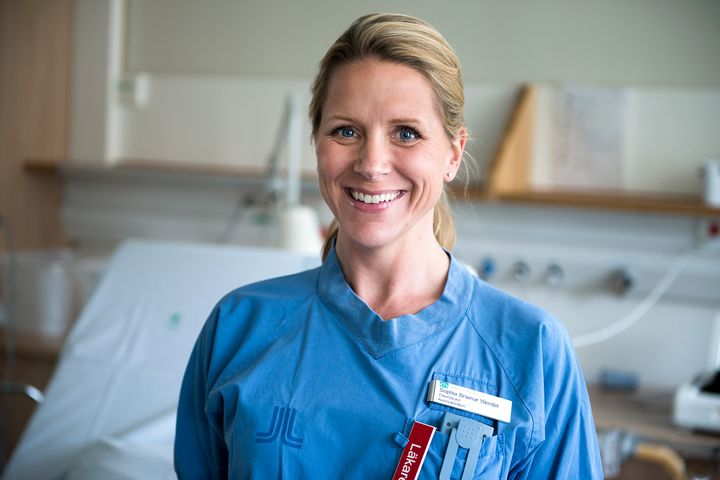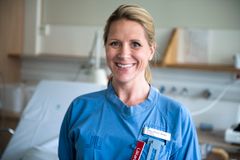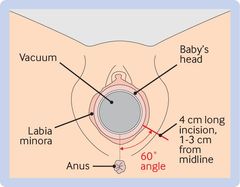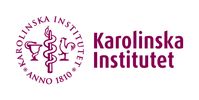Perineal cut reduces the risk of serious birth injury
In first-time mothers requiring vacuum-assisted delivery, a lateral episiotomy (angled cut) in the tissue between the vaginal and anal opening more than halves the risk of obstetric anal sphincter injury, a severe form of perineal trauma between the vulva and anus. This according to a randomised clinical study led by researchers at Karolinska Institutet and Stockholm’s Danderyd Hospital, the results of which are published in The BMJ.

Obstetric Anal Sphincter Injury (OASI), which involves the anal sphincter muscles, can lead to anal incontinence with difficulties retaining gas and faeces. It can also cause sexual problems and impair quality of life. This serious form of perineal injury affects around five per cent of all first-time mothers in Sweden who have a vaginal birth.
”Women giving birth for the first time and requiring instrumental birth are at the highest risk of sustaining OASI,” says Sophia Brismar Wendel, associate professor in obstetrics and gynaecology at the Department of Clinical Sciences, Danderyd Hospital, Karolinska Institutet and senior consultant at the Department of Women's Health, Danderyd Hospital. ”Therefore, we wanted to assess if such injury could be prevented in this group with a lateral episiotomy (angled cut in the perineum) when the baby's head is crowning.”
Participants were recruited to the EVA (Episiotomy in Vacuum Assisted delivery) trial at eight Swedish hospitals between 2017 and 2023. Over 6 100 pregnant women expecting their first child agreed to take part if the delivery required vacuum assistance. A total of 702 women with a vacuum assisted delivery were randomly assigned to receive a lateral episiotomy or no episiotomy.
The lateral episiotomy reduced the risk of OASI by an average of 53 per cent. Among the women assigned to the procedure, 6.1 per cent sustained an OASI, compared to 13.1 per cent in the comparison group. Moreover, the procedure did not increase the risk of severe blood loss, negative birth experience, prolonged hospitalisation or additional complications. However, the risk of wound complications such as wound infection and wound dehiscence was increased in the episiotomy group.
”Episiotomy as a medical intervention is controversial as it has historically also been used for normal births, sometimes without the woman's consent,” says Sophia Brismar Wendel. ”The use of episiotomy is highly variable in different countries, and in Sweden we've practised restrictive use given the lack of evidence. However, these results may impact obstetric care both in Sweden and elsewhere.”
The trial is also gathering data on the women's self-reported symptoms at one and five years after childbirth. The results from the one-year follow-up will soon be analysed, which might give some answers about any differences in symptoms, such as anal incontinence and sexual function.
”This may help doctors and pregnant women in shared informed decision-making regarding the use of a prophylactic lateral episiotomy,” says Sophia Brismar Wendel.
The hospitals participating in the EVA study are the University Hospital of Umeå, Falun Hospital, Uppsala University Hospital, Danderyd Hospital, Stockholm South General (Söder) Hospital, Växjö Central Hospital, Sahlgrenska University Hospital - Östra, and Helsingborg Hospital. The study was primarily financed by the Swedish Research Council, Region Stockholm and the Uppsala-Örebro Regional Research Council. There are no reported conflicts of interest.
Publication: ”Lateral episiotomy or no episiotomy in vacuum assisted delivery in nulliparous women (EVA): multicentre, open label, randomised controlled trial”, Sandra Bergendahl, Maria Jonsson, Susanne Hesselman, Victoria Ankarcrona, Åsa Leijonhufvud, Anna-Carin Wihlbäck, Tove Wallström, Emmie Rydström, Hanna Friberg, Helena Kopp Kallner, Sophia Brismar Wendel, The BMJ, online 17 June 2024, doi: 10.1136/bmj-2023-079014.
Editorial about the study: ”Lateral episiotomy during vacuum assisted childbirth”
Contacts
For more information, please contact:
Sophia Brismar Wendel, associate professor, senior consultant
Department of Clinical Sciences, Danderyd Hospital, Karolinska Institutet
Department of Women’s Health, Danderyd Hospital
Email: sophia.brismar@ki.se
Phone: +46 722 024895
Images


Karolinska Institutet (https://ki.se/en) is one of the world’s leading medical universities. Our vision is to advance knowledge about life and strive towards better health for all. Karolinska Institutet accounts for the single largest share of all academic medical research conducted in Sweden and offers the country’s broadest range of education in medicine and health sciences. The Nobel Assembly at Karolinska Institutet selects the Nobel laureates in Physiology or Medicine.
Subscribe to releases from Karolinska Institutet - English
Subscribe to all the latest releases from Karolinska Institutet - English by registering your e-mail address below. You can unsubscribe at any time.
Latest releases from Karolinska Institutet - English
Using social media may impair children’s attention8.12.2025 06:01:00 CET | Press Release
Children who spend a significant amount of time on social media tend to experience a gradual decline in their ability to concentrate. This is according to a comprehensive study from Karolinska Institutet, published in Pediatrics Open Science, where researchers followed more than 8,000 children from around age 10 through age 14.
POTS common in patients with long COVID3.10.2025 11:33:37 CEST | Press Release
A new study from Karolinska Institutet in Sweden shows that an unusual heart rhythm disorder, POTS, is particularly common in people with long COVID. The majority of those affected are middle-aged women. The study is published in the scientific journal Circulation: Arrhythmia and Electrophysiology.
Simple test can predict risk of severe liver disease29.9.2025 09:00:00 CEST | Press Release
A new study from Karolinska Institutet, published in the scientific journal The BMJ, shows how a simple blood analysis can predict the risk of developing severe liver disease. The method may already start to be applied in primary care to enable the earlier detection of cirrhosis and cancer of the liver.
Press invitation: Announcement of the Nobel Prize in Physiology or Medicine 202523.9.2025 13:00:00 CEST | Press Invitation
The Nobel Prize in Physiology or Medicine 2025 will be announced on Monday October 6 at 11.30 am CEST (at the earliest).
How mutations in bodily tissues affect ageing20.8.2025 11:00:00 CEST | Pressmeddelande
Two new studies from Karolinska Institutet in Sweden have investigated how mutations that occur in muscles and blood vessels over time can affect ageing. The studies, which are published in Nature Aging, show that such mutations can reduce muscle strength and accelerate blood vessel ageing. The results can be of significance to the treatment of age-related diseases.
In our pressroom you can read all our latest releases, find our press contacts, images, documents and other relevant information about us.
Visit our pressroom